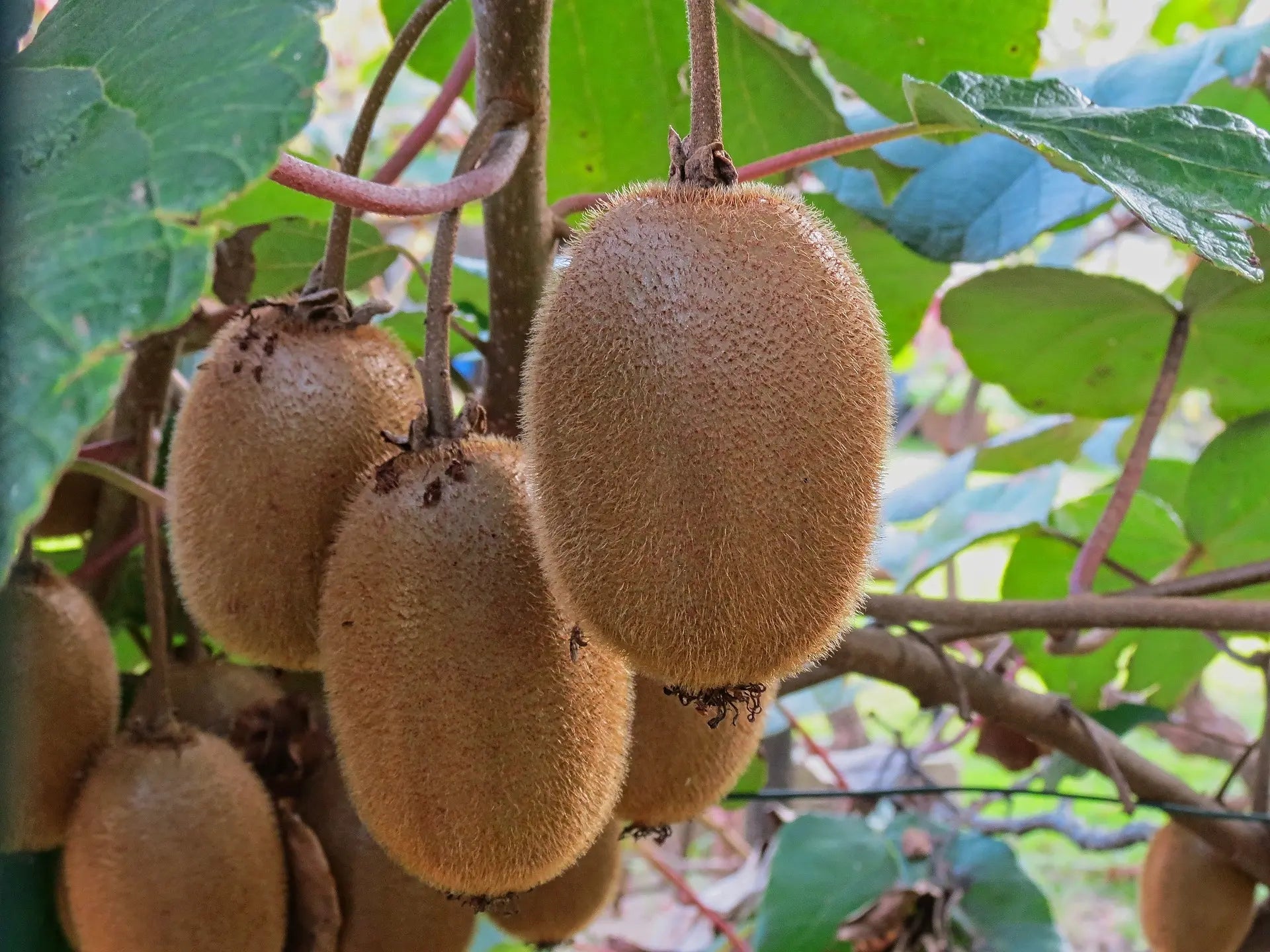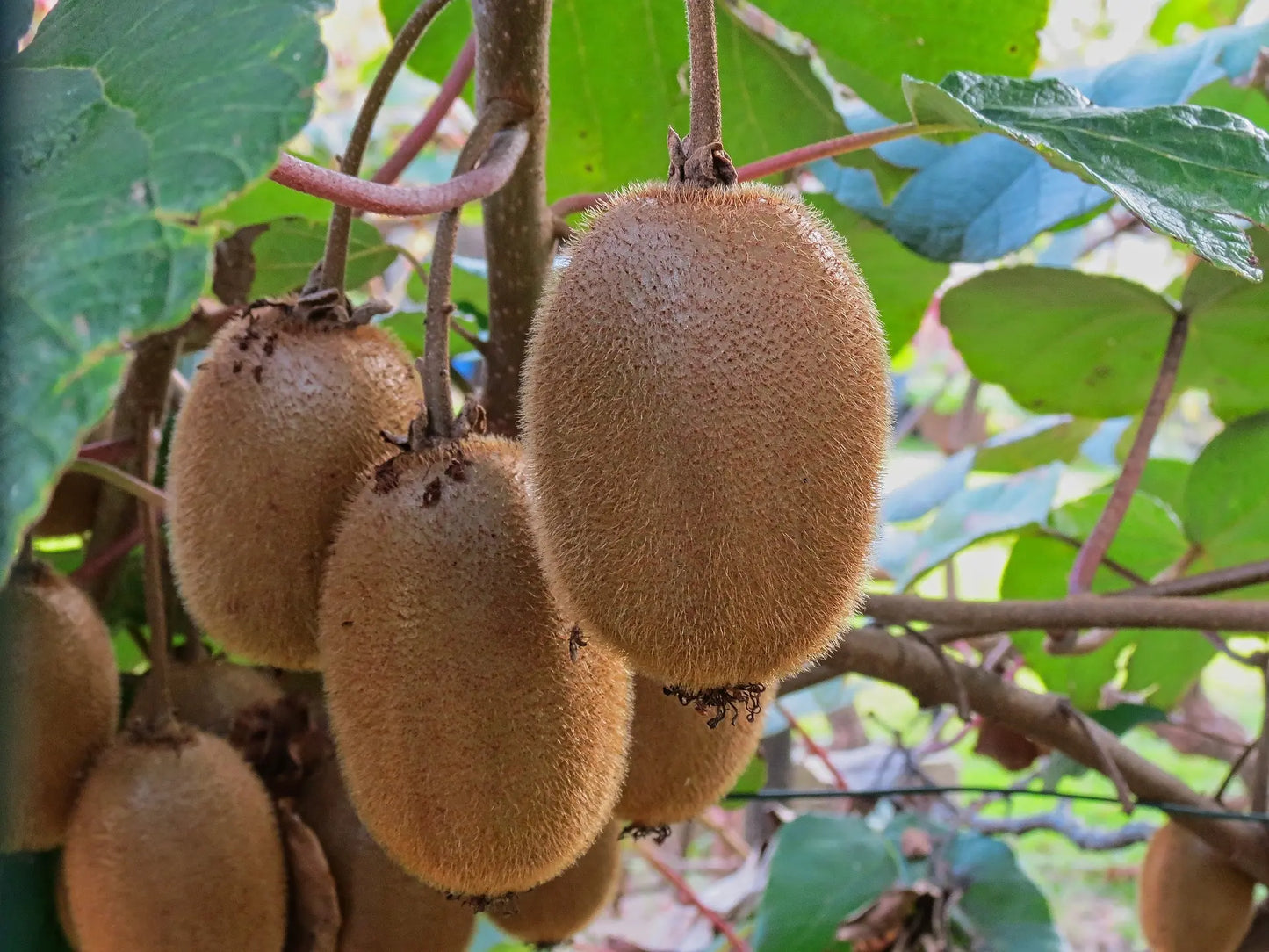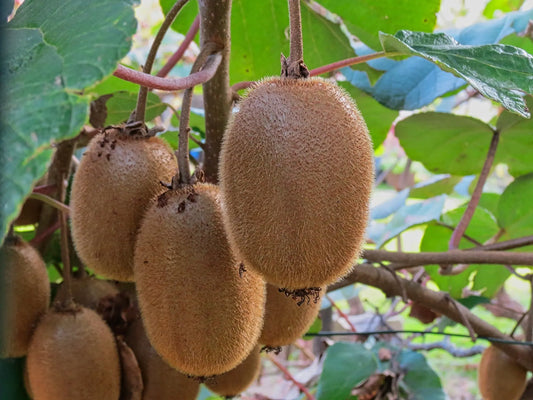Origins and Particularities of the Kiwi Jenny
A Self-Fertile Variety for Simplicity
Unlike other varieties that require a male pollinator, the Jenny kiwi is self-fertile. This means it can produce fruit without the need for another plant, making it much easier to grow.
While self-fertility is a definite advantage, adding a male plant like the Minkimale Kiwi can further increase fruit size and quality. At Kiwiverse, we offer a wide range of kiwi plants to meet all your growing requirements.
A Plant Adapted to French Climates
The Kiwi Jenny is perfectly suited to French climates, particularly north of the Loire, thanks to its exceptional hardiness. Resistant to temperatures down to -18°C, it is suitable for both small gardens and large farms.
Characteristics of Kiwi Fruits Jenny
Tasty Fruits and Rich Nutrients
- Flesh color: Green, sometimes yellow depending on growing conditions.
- Size and weight: Approximately 5 cm in diameter with an average weight of 50 grams.
- Flavor: Sweet, fragrant, and juicy, ideal for direct consumption or for culinary recipes.
Nutritional richness
- High content of vitamin C and K, strengthening the immune system.
- Important source of potassium, magnesium and fiber, beneficial for digestion.
Culinary Use
Kiwi Jenny is versatile in the kitchen:
- Eaten fresh as a dessert.
- Used for smoothies, fruit salads, jams or sweet sauces.
With Kiwiverse, you can buy Jenny kiwi plant and offer your customers tasty and healthy fruits.
Characteristics of the Kiwi Jenny Plant
A Climbing and Aesthetic Plant
- Adult Size: Reaches 3 to 4 meters in height, but can climb up to 6 meters with adequate support.
- Foliage: Deciduous, light green, taking on yellow hues in autumn.
- Flowering: Creamy white flowers appearing in May-June, attracting natural pollinators such as bees.
Kiwi Jenny Growing Requirements
Soil and Planting
- Soil Type: Prefers humus-rich, well-drained soil with a slightly acidic pH (6 to 6.5).
- Avoid limescale: Chalky soil can cause chlorosis, reducing vigor and production.
Location
- Exposure: Sunny for optimal flowering and fruiting.
- Shelter: Against cold winds.
Support and Trellising
As Kiwi Jenny is a climbing plant, it requires a sturdy support:
- Pergola, trellis or wire mesh to guide its growth.
- Training the stems as they develop for better space management.
Maintenance and Harvest
Watering and Fertilization
- Watering: Regular but moderate, especially during dry periods. Avoid overwatering to prevent root asphyxiation.
- Fertilization: Apply organic fertilizer or well-rotted compost in late winter to stimulate growth.
Size
- When: Annual pruning in late winter to control plant structure.
- Why: Promotes abundant fruiting and maintains a harmonious shape.
Production and Harvest
- Fruit maturity: From mid-October, fruits can be harvested until November.
- Yield: Up to 60 kg per plant after 10 years of cultivation.
Conservation
- Can be stored for more than a month at 5°C.
- To speed up ripening, place the fruit near apples or bananas.
Benefits of Kiwi Jenny with Kiwiverse
- Ease of Cultivation: Thanks to its self-fertility, the Kiwi Jenny only requires one plant to produce fruit.
- High Productivity: With yields of up to 60 kg per plant, this variety is ideal for professional or amateur orchards.
- Cold Resistance: Adapted to the French climate, it tolerates extreme temperatures (-18°C).
- Versatility: Whether for a fruit hedge, a pergola or growing in a container, the Kiwi Jenny fits perfectly into various growing systems.
Why Choose Kiwiverse?
A Specialized Wholesale Supplier
As a specialist in kiwi plants, Kiwiverse supports professional and amateur growers with:
- A wide range of self-fertile or pollinating plants.
- Careful delivery directly to your plot or farm.
- Dedicated technical support to ensure the success of your agricultural projects.
Buy your Jenny kiwi plants now and benefit from our expertise in kiwi cultivation for a productive and sustainable orchard.
Frequently Asked Questions
- Is the Jenny kiwi truly self-fertile? Yes, it can produce fruit without requiring another plant for pollination.
- Can the Kiwi Jenny be grown in a container? Absolutely, it adapts very well to growing in pots or containers, ideal for patios and small spaces.
- When is the best time to plant Kiwi Jenny? Planting is recommended in autumn or spring, when the soil is loose and not frozen.
- What types of supports are suitable for Kiwi Jenny? Use a pergola, trellis, or sturdy wire mesh to support this climbing plant.
- What yields can you expect from Kiwi Jenny? After 10 years, each plant can produce between 30 and 60 kg of fruit per year, depending on growing conditions.
- Does Kiwiverse deliver everywhere in France? Yes, we deliver directly to your plot or farm, anywhere in France.
Conclusion: Kiwi Jenny and Kiwiverse, A Perfect Alliance
Kiwi Jenny is an ideal solution for kiwi growers looking for a self-fertile, productive, and easy-to-maintain variety. With its resistance to sub-zero temperatures, its nutritional richness, and its versatility, it perfectly meets the needs of both amateurs and professionals.
By choosing Kiwiverse, a specialist wholesale supplier of kiwi plants, you can rest assured that you're working with experts dedicated to the success of your projects. Take advantage of our producer prices to purchase your Jenny kiwi plants and launch your orchard in the best possible conditions.







